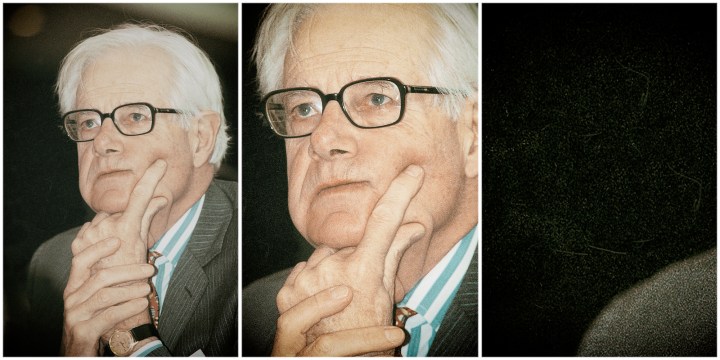BUSINESS REFLECTION
After the Bell: JOT — a man for all reasons

Allow me to pay a brief tribute to a great South African businessman, Julian Ogilvie Thompson, the former Anglo American and De Beers executive chairman, who died last week at the age of 89.
Julian Ogilvie Thompson — JOT to his colleagues and friends — was not the man thrust with the baton of playing a role in the prelude to SA’s transition to democracy. That responsibility fell to his predecessor, Gavin Relly, who famously led the first delegation of SA businesspeople to meet the ANC in Lusaka in 1985. JOT was not on that trip.
By the time SA’s politics had moved on, and Relly’s intervention had proved prescient, JOT’s job was arguably even more difficult; the baton passed to him was to sell the outlandish idea that politicians, South African politicians in particular, would be sensible once all other options for a peaceful solution had been attempted. Circa 1994, that seemed inevitable. Circa 1992, amid the massacres and continuing political strife, that seemed pretty unlikely.
There is a fabulous profile of JOT in the UK Independent written during this period that describes him perfectly, at least according to my modest knowledge. Writer Gail Counsell described JOT as inhabiting a style known as Discreet English.
“From his pale blue public-school voice to his unexciting tie, the 58-year-old South African chairman of the sprawling Anglo American financial and mining empire is a model of British understatement,” Counsell wrote.
JOT was well on his way to convincing sceptical investors to invest in Anglo. But since Anglo was then almost a proxy for South African business, that job included persuading a broader, equally sceptical public that SA’s politicians would reach an acceptable compact.
This fit his worldview neatly. The same article described JOT as, “Aesthetic, intellectual, convinced an appeal to reason will be sufficient to resolve any problem, no matter how emotionally charged.” His argument was simply that “none of the main parties thinks they can make it by fighting it out. After two or three months, we’re confident that they’ll get back into the process. In the end, logic does prevail. It has to prevail and their leaders know this.”
And you know, he was right. His appeal to and expectations of calm logic were not accidental either; they came very much out of the copybook of his mentor Harry Oppenheimer. Anglo had at the time an unusual system in which a promising employee would act as Oppenheimer’s “secretary” and gradually get to know the full gamut of the business, and would, in time, be assigned to a senior position.
JOT fit this profile perfectly: his father was a Supreme Court Appellate Division judge; he went to school at Bishops, and then on a Rhodes Scholarship to Oxford, where he read politics, philosophy and economics. Oppenheimer wrote in his unpublished memoir that JOT was, “I think perhaps the cleverest executive we ever had in the group.” He was appointed when he was 23 and spent the next 46 years with the Anglo group in various capacities.
In the early years of SA’s democracy, he participated in the Brenthurst Group discussions with senior ANC politicians. Michael Cardo’s excellent biography Harry Oppenheimer: Diamonds, Gold and Dynasty records that it was Alec Erwin, the former trade unionist soon to become Nelson Mandela’s deputy minister of finance, who contacted another Anglo exec, Bobby Godsell, at the end of January 1994 at Mandela’s behest, and got the ball rolling on the get-togethers.
Mandela was keen for the ANC’s economics brains trust to meet with “a group of leading businessmen”, Julian Ogilvie Thompson wrote confidentially to Donald Gordon, “to lay the foundation for a constructive pattern of relationships” with the business community after the election.
Cardo records that the group was not able to convince the ANC of much economically, and perhaps this led to one of the biggest corporate decisions that JOT presided over, to move Anglo’s primary listing to London. Effectively, Anglo relinquished its leading role in South African business, and, at least partially, emigrated.
I’ve written before that I think this was ultimately a terrible decision, but I would be hard-pressed to say it wasn’t logical at the time. Anglo struggled for years to find traction in London because the market hated its conglomerate structure, its South African-dominated assets, and its comparatively lacklustre balance sheet compared with the two big Australian mining companies also on the London exchange at the time, BHP and Rio.
Still, Anglo has persevered and following years of restructuring, divestments and a catastrophe here and there, is arguably in better shape now than its former homeland. What has remained is something Oppenheimer, Relly, JOT and some of the farsighted members of the ANC pioneered: the notion of politicians and big business cooperating in the name of keeping the country loosely on course. Seldom has this been more necessary than now. The recent pledge by more than 100 senior businesspeople to develop the country has to some extent its roots in the innate sensibleness of their predecessors, including JOT.
Now all we need is politicians who actually grasp and act on the advice offered in good faith. In the meantime, RIP JOT. Logic will prevail in the end. DM



















One of the last of the old style gentlemen businessmen. Pity there aren’t more of them.
JOT wasn’t British. He was born and bred in South Africa, but I suppose he cultivated an English Gent persona for himself. A clever guy who steered Anglo American through some tricky times.